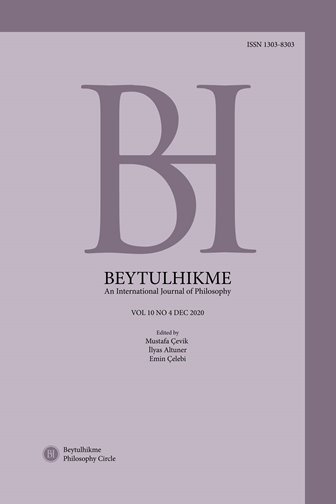Author :
Abstract
Homeros, MÖ yedinci yüzyıldan itibaren İyonya filozofları, ozanlar ve tarihçiler tarafından adı anılmaya başlanmış yüzyıllar boyunca da Yunan kültürüne etki etmiş önemli ozanlardan birisidir. Öyle ki Platon’a gelene kadar Homeros’un adını anmayan bir yazardan söz etmek neredeyse imkansızdır. Bunun nedeni hem Homeros hem de Hesiodos’un destanlarında Yunanlıların tüm inançlarını, gelenek ve göreneklerini, duygu ve tutkularını açığa çıkaran bir dinin gizli olmasıdır. Tanrıların işlerinin, adlarının belirtildiği bu din aynı zamanda Yunanlıların mitolojisidir. Azra Erhat’ın ifadesiyle belirtmek gerekirse Homeros, “Platon zamanında yalnız bir şiir değil, kutsal bir kitaptır” (Homeros, 2014, s. 11). Yunan dini, politikası, askerliği konusunda temel bir başvuru kaynağı olan Homeros’un, Platon’un ideal devletinden sürgün edilmesi oldukça dikkat çekicidir. Bu çalışmanın temel meselesini de Platon’un Homeros’la olan tartışması oluşturur. Bu bağlamda çalışma Platon’un Devlet isimli diyalogunu merkeze alarak filozof ve şair arasındaki çatışmayı ve Platon’u bu düşünceye iten nedenleri çözümlemeyi amaçlamaktadır.
Keywords
Abstract
Homer was mentioned by Ionian philosophers, poets, and historians since the seventh century BC and is one of the important poets who influenced Greek culture for centuries. So much so that it is almost impossible to talk about a writer who did not mention Homer’s name until it came to Plato. The reason for this is that in the epics of both Homer and Hesiod, a religion that reveals all the beliefs, customs and traditions, feelings, and passions of the Greeks is hidden. This religion, in which the deeds and names of the gods are mentioned, is also the mythology of the Greeks. To put it in the words of Azra Erhat, Homer was “not only a poem in Plato’s time, but a holy book”. It is remarkable that Homer, who is a basic reference for Greek religion, politics, and military service, was exiled from Plato’s ideal state. The main issue of this study is Plato’s argument with Homer. In this context, the study aims to analyze the conflict between the philosopher and the poet and the reasons that pushed Plato to this idea by centering Plato's dialogue titled The Republic.
Keywords
- Aristoteles (2007). Poetika: Şiir Sanatı Üzerine. (Çev. S. Rifat). İstanbul: Can Ya- yınları.
- Aristoteles (1998). Nikomakhos’a Etik. (Çev.S. Babür). Ankara: Ayraç Kitabevi.
- Arslan, A. (2006). İlkçağ Felsefe Tarihi 3: Sofistlerden Platon’a. İstanbul: İstanbul Bilgi Üniversitesi Yayınları.
- Asmis, E. (2006). Plato On Poetic Creativity. A Companion to Plato. (Ed. R. Kraut). Cambridge: Cambridge University Press, 338-364.
- Aşkın, Z. & Cılız, F. (2016). Platon’da Güzel, Aletheia ve Sanat İlişkisi. Beytulhik- me An International Journal of Philosophy, 6 (1), 195-209.
- Barnes, J. (2004). Sokrates Öncesi Yunan Felsefesi. (Çev. H. Portakal). İstanbul: Cem Yayınevi.
- Buxton, R. (2016). Yunan Mitolojisi. (Çev. A. F. Yıldırım). İstanbul: Alfa Basın Yayın.
- Bozkurt, N. (2012). Sanat ve Estetik Kuramları. Ankara: Sentez Yayıncılık.
- Cevizci, A. (2018). Eğitim Felsefesi. Ankara: Say Yayınları.
- Çağrı Mutlu, E. (2018). Öğretmen Homeros. Beytulhikme An International Journal of Philosophy, 8 (1), 319-338.
- Demir A. & Gece Çelikkan, Ş. (2018). Platon’da Siyaset ve Sanat. İstanbul: Yayın Dünyamız Yayınları.
- Dürüşken, Ç. (2013). Antikçağ Felsefesi: Homeros’tan Augustinus’a Bir Düşünce Serüve- ni. İstanbul: Alfa Basım Yayım.
- Guthrie, W. K. C. (2011). Yunan Felsefe Tarihi: Sokrates Öncesi İlk Filozoflar ve Pyt- hagorasçılar. (Çev. E. Akça). İstanbul: Kabalcı Yayınevi.
- Havelock, E. A. (2015). Platon: Filozof Şaire Karşı. (Çev. A. Beyaz). İstanbul: Pinhan Yayıncılık.
- Herakleitos (2005). Fragmanlar. (Çev. C. Çakmak). İstanbul: Kabalcı Yayınevi.
- Homeros (2014). İlyada. (Çev. A. Erhat & A. Kadir). İstanbul: Türkiye İş Bankası Kültür Yayınları.
- Murdoch, I. (1977). Ateş ve Güneş: Platon Sanatçıları Niçin Dışladı? (Çev. S. R. Kır- koğlu). İstanbul: Ayrıntı Yayınları.
- Mutlu, B. (2017). Platon’da ve Platon Öncesi Metinlerde Mimesis. Art-Sanat Der- gisi, 8, 9-34.
- Noddings, N. (2017). Eğitim Felsefesi. (Çev. R. Çelik). Ankara: Nobel Akademik
- Platon (2005). Devlet. (Çev. S. Eyuboğlu & M. A. Cimcoz). İstanbul: Türkiye İş Bankası Kültür Yayınları.
- Sayers, S. (1999). Plato’s Republic: An Introduction. Edinburgh: Edinburgh Univer- sity Press.
- Tunalı, İ. (2008). Grek Estetik’i: Güzellik Felsefesi, Sanat Felsefesi. İstanbul: Remzi Kitabevi.
- Zeller, E. (2001). Grek Felsefesi Tarihi. (Çev. A. Aydoğan). İstanbul: İz Yayıncılık. Öz: Homeros, MÖ yedinci yüzyıldan itibaren İyonya filozofları, ozanlar ve tarihçiler tarafından adı anılmaya başlanmış yüzyıllar boyunca da Yunan kültürüne etki etmiş önemli ozanlardan birisidir. Öyle ki Platon’a gelene kadar Homeros’un adını anmayan bir yazardan söz etmek neredeyse imkansızdır. Bunun nedeni hem Homeros hem de Hesiodos’un destanlarında Yunanlıların tüm inançlarını, gelenek ve göreneklerini, duygu ve tutkularını açığa çıkaran bir dinin gizli olmasıdır. Tanrıların işlerinin, adlarının belirtildiği bu din aynı zamanda Yunanlıların mitolojisidir. Azra Erhat’ın ifadesiyle belirtmek gerekirse Homeros, “Platon zamanında yalnız bir şiir değil, kutsal bir kitaptır” (Homeros, 2014, s. 11). Yunan dini, politikası, askerliği konusunda temel bir başvuru kaynağı olan Homeros’un, Platon’un ideal devletinden sürgün edilmesi oldukça dikkat çekicidir. Bu çalışmanın temel meselesini de Platon’un Homeros’la olan tartışması oluşturur. Bu bağlamda çalışma Platon’un Devlet isimli diyalogunu merkeze alarak filozof ve şair arasındaki çatışmayı ve Platon’u bu düşünceye iten nedenleri çözümlemeyi amaçlamaktadır. Anahtar Kelimeler: Homeros, taklit (mimesis), şair (poietes), eğitim (paideia), devlet (politeia).





